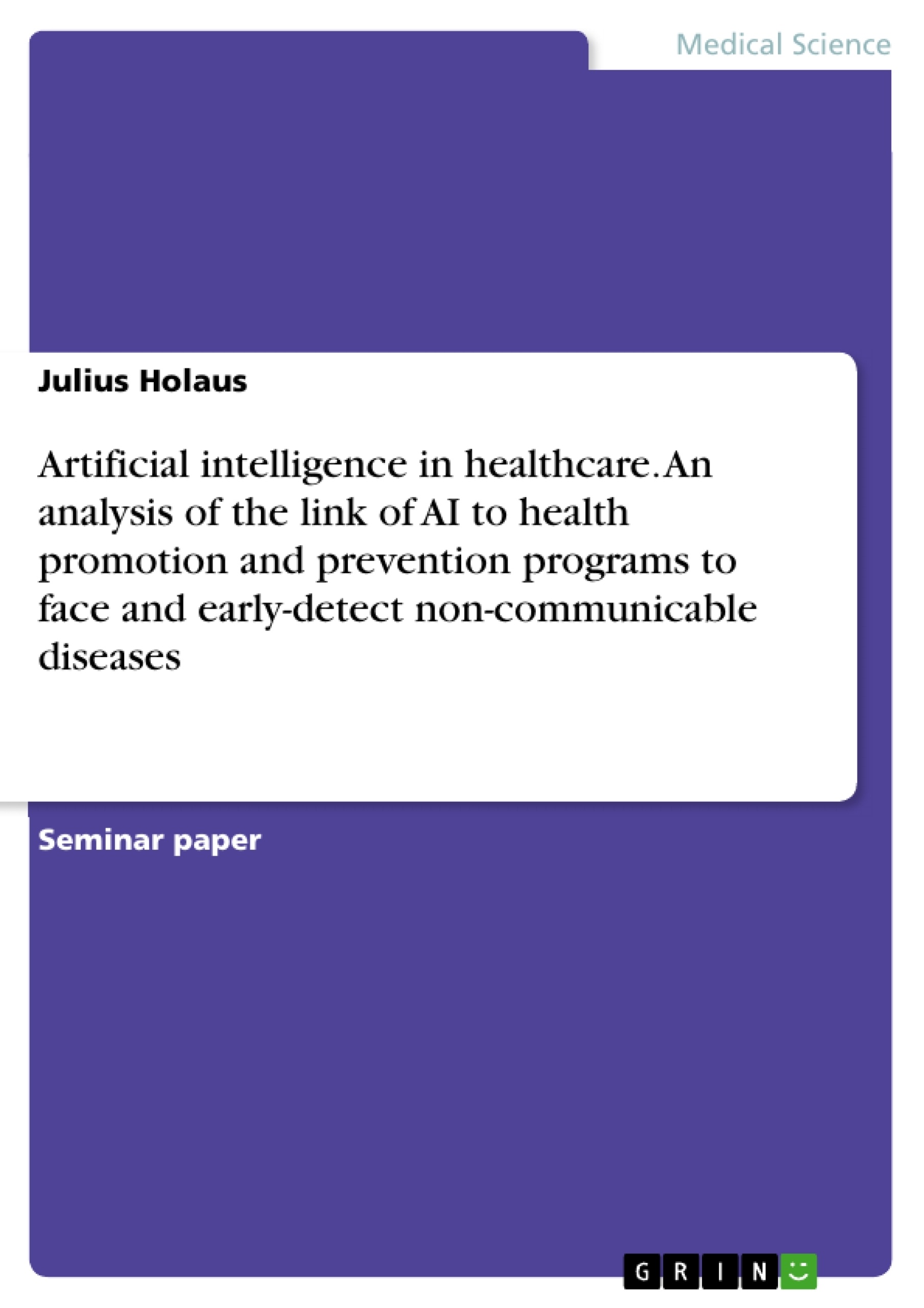The global challenge against non-communicable diseases gained transnational attention over the last years. Statistics illustrate, that approximately 70% of all deaths worldwide can be traced back to chronic diseases. On the other hand, artificial intelligence is on the rise as the number of implemented software featuring machine-learning skills increased tremendously in the last years. Therefore, the purpose of this literature review is to combine those aspects in order to create synergies of the link between existing approaches with the aim to face non-communicable diseases and artificial intelligence. The review focusses firstly specifically only on the most prevalent NCDs and their characteristics before analysing the rise of machine-learning software from the very beginning. In a next step, those two fields will be combined with the aim to point out both benefits and risks when implementing AI in the healthcare sector. The outcome was, that the use of such software would definitely cut a three-digit number of billions of Euros of spending on healthcare due to the possibility to early-detect diseases and the hereby arising possibility to treat patients in a more efficient way as until now. On the other hand, the biggest risk will be, that artificial intelligence works on huge datasets that need to be set up first – during the setting up process of such data, failures can take place which would have a grave impact on further use.
Inhaltsverzeichnis (Table of Contents)
- ABSTRACT
- LIST OF FIGURES
- 1. INTRODUCTION
- 2. NON-COMMUNICABLE DISEASES
- 2.1 GENERAL INFORMATION ABOUT THE MOST PREVALENT NCDS
- 2.2 HEALTH PROMOTION AND PREVENTION PROGRAMS
- 2.2.1 THE HIGH-RISK APPROACH
- 2.2.2 THE POPULATION APPROACH
- 3. ARTIFICIAL INTELLIGENCE
- 3.1 HISTORICAL DEVELOPMENT
- 4. ARTIFICIAL INTELLIGENCE IN THE HEALTHCARE SECTOR
- 4.1 BENEFITS
- 4.2 RISKS
- BIBLIOGRAPHY
Zielsetzung und Themenschwerpunkte (Objectives and Key Themes)
This literature review aims to explore the connection between artificial intelligence (AI) and health promotion and prevention programs focused on non-communicable diseases (NCDs). It examines how AI can be leveraged to address the global challenge of NCDs, particularly the four most prevalent ones: cardiovascular diseases, cancer, chronic respiratory diseases, and diabetes. The review highlights the historical development of AI and its increasing application in the healthcare sector, analyzing both the potential benefits and risks associated with AI implementation in healthcare.
- The growing global burden of non-communicable diseases
- The potential of artificial intelligence to improve healthcare outcomes
- The benefits and risks of implementing AI in health promotion and prevention programs
- The use of AI in early disease detection and treatment
- The ethical and societal implications of AI in healthcare
Zusammenfassung der Kapitel (Chapter Summaries)
- Introduction: This chapter sets the stage for the literature review by outlining the global prevalence and impact of non-communicable diseases (NCDs). It highlights the four most prevalent NCDs and their significant contribution to global mortality and morbidity. The chapter emphasizes the need for effective solutions to address this growing public health challenge.
- Non-Communicable Diseases: This chapter provides a detailed overview of NCDs, focusing on their characteristics and the most prevalent types. It explores the role of behavior factors, such as tobacco use, alcohol consumption, and physical inactivity, in increasing the risk of NCDs. The chapter also discusses the socioeconomic and economic consequences of NCDs, highlighting their impact on individuals, families, and national economies.
- Artificial Intelligence: This chapter traces the historical development of artificial intelligence (AI), exploring its evolution from early concepts to its increasing presence in various sectors. It delves into the key principles and technologies underlying AI, emphasizing its potential to revolutionize various fields, including healthcare.
- Artificial Intelligence in the Healthcare Sector: This chapter focuses specifically on the application of AI in the healthcare sector. It explores the numerous benefits of using AI to improve health outcomes, such as early disease detection, personalized treatment plans, and efficient resource allocation. The chapter also acknowledges the potential risks associated with AI in healthcare, including data privacy concerns, algorithmic bias, and the need for responsible implementation.
Schlüsselwörter (Keywords)
This literature review focuses on the key concepts of non-communicable diseases, artificial intelligence, health promotion, disease prevention, early detection, and the healthcare sector. The study explores the interplay of these concepts, examining how AI can be utilized to address the growing burden of NCDs and enhance healthcare delivery.
Frequently Asked Questions
How can AI help address non-communicable diseases (NCDs)?
AI can be used for the early detection of diseases like cancer or diabetes, allowing for more efficient and personalized treatment plans, which can significantly reduce healthcare costs.
What are the most prevalent NCDs globally?
The four most prevalent non-communicable diseases are cardiovascular diseases, cancer, chronic respiratory diseases, and diabetes, which together account for a large percentage of deaths worldwide.
What are the main risks of implementing AI in healthcare?
The biggest risk involves the quality of datasets. If the initial data used for machine learning is flawed, it can lead to grave errors in diagnosis and treatment. Data privacy and algorithmic bias are also significant concerns.
What is the "population approach" in health promotion?
The population approach aims to lower the risk of NCDs across the entire community by addressing common behavioral factors like tobacco use, alcohol consumption, and physical inactivity.
Can AI reduce global healthcare spending?
Yes, studies suggest that implementing AI for early detection and efficient resource allocation could potentially save hundreds of billions of Euros in healthcare spending annually.
- Citar trabajo
- Julius Holaus (Autor), 2019, Artificial intelligence in healthcare. An analysis of the link of AI to health promotion and prevention programs to face and early-detect non-communicable diseases, Múnich, GRIN Verlag, https://www.grin.com/document/491644



